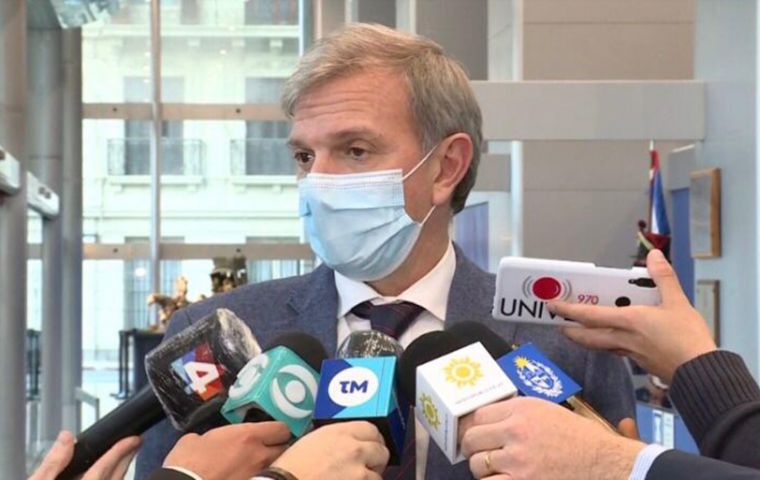MercoPress. South Atlantic News Agency
Uruguayan clubs and gyms must control vaccination if they want more people in
 The return of crowds to football stadiums is also under consideration for those vaccinated, Bauzá said
The return of crowds to football stadiums is also under consideration for those vaccinated, Bauzá said Uruguay's Sports Secretary Sebastián Bauzá has said that clubs and gymnasiums interested in allowing more people to attend their facilities shall need to verify the COVID-19 vaccination status of their members.
Bauzá also explained, according to a report published Thursday by Montevideo's daily El País that a 65% capacity could be reached, “as long as all those who are inside are vaccinated.”
“It will be the responsibility of each club and gym to control vaccination to have a greater capacity. Perhaps, up to 65%, as long as all those who are inside are vaccinated,” Bauzá was quoted as saying.
Clubs and gyms are currently allowed to host up to 45% of their capacity.
Bauzá had also said last week that the return of crowds to football stadiums was under consideration “from August” but only for fully vaccinated people or for those who have had the disease less than three months before the event, while children up to 12 years of age who are not included in the vaccination plan would also be allowed to attend sports events if accompanied by their parents.
Meanwhile, Uruguay's vaccination drive has been hit by scientific findings in Chile regarding the effectiveness of the Sinovac vaccine after six months and the need for a third dose is also now under consideration.
Presidential Secretary Álvaro Delgado explained Thursday that for those vaccinated with Pfizer, the third dose should come “a year after immunization,” while regarding Sinovac, Uruguayan scientists were still evaluating the situation.
“In the case of Pfizer, due to the studies that exist, [the third dose] should be only one year after immunization. In the case of Sinovac, we are looking at the issue of antibody levels.”
Delgado also explained that a boost shot was being studied “for the immunosuppressed and surely for people with comorbidities,” while a decision from the Vaccine Commission of the Ministry of Public Health (MSP) was due in the coming days. But if a third dose is needed for those who got Sinovac, “it will be with Pfizer,” he said.
“There is already a global decision that this is going to have at least one annual boost, beyond the fact that there is a boost in the first year of immunization,” Delgado pointed out.
A scientific report from Chile has indicated Sinovac's effectiveness decreases over time and is less protective against the Delta variant of the coronavirus.
The World Health Organization, however, has advised on ethical grounds against boosting doses before vaccines “reach the whole world.”
Uruguay is among the 10 countries or economies with the most doses administered in relation to the size of its population. More than 70% of Uruguayans have received at least one dose when the world average is 26.8%.
Immunologist María Moreno, a member of the vaccine advisory commission, was quoted by El País as explaining that ”it makes no sense to vaccinate (with boosters) without having clear evidence that a third dose will protect you at the level of transmission.“
”It raises doubts to me because you reinforce the system at the immune level but not necessarily at the mucosal level,“ she added, as she also stressed there were other “non-pharmacological tools” to be considered for the fight against the new coronavirus variants.
The Montevideo newspaper also highlights the case of Israel, where the entire population has been given doses of Pfizer. ”The vaccine is giving less protection since the middle of June: especially in mild infections, whose protection is 50%. And then the protection against a serious illness has dropped from 98% to 93%. We still do not know if this is due to the Delta variant if six months have passed since the vaccination of people,” Jaim Rafalowski, a member of Israel's Coronavirus Crisis Table told El País.
Meanwhile, Uruguay's Ministry of Tourism has admitted to having taken into consideration different proposals for the country to become a destination for tourists who want to access vaccines.
“We are planning a reopening of borders to foreigners, ordered for next September,” Tourism Minister Germán Cardoso said. He also explained the proposal was to allow travellers to enter the country and be vaccinated, provided they stay for at least 21 days.




Top Comments
Disclaimer & comment rulesCommenting for this story is now closed.
If you have a Facebook account, become a fan and comment on our Facebook Page!